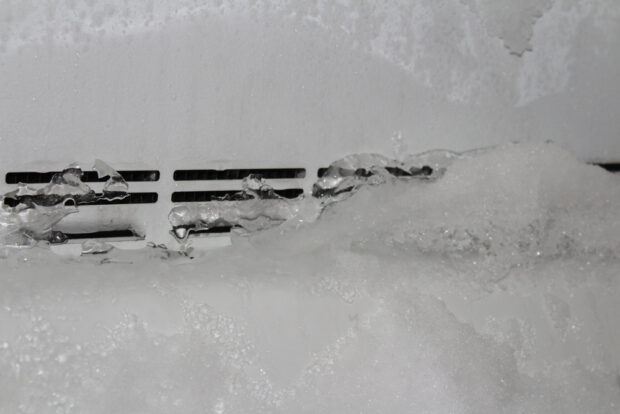A frosty freezer may seem like a small nuisance, but it can lead to a variety of problems. Not only does frost buildup take up valuable space, but it can also make your freezer work harder, leading to inefficiency and higher energy bills. Fortunately, preventing freezer frost buildup is easier than you might think. With a few simple tips and habits, you can ensure that your freezer stays frost-free and operates at its best. In this article, we’ll guide you through practical ways to stop frost buildup in your freezer, helping you maintain its efficiency and prolong its lifespan.
Understanding the Cause of Freezer Frost
Before diving into how to prevent frost buildup in a freezer, it’s important to understand why frost forms in the first place. Freezer frost is primarily caused by excess moisture in the air inside the freezer. When warm air enters the freezer, either through an open door or a faulty seal, it cools down and condenses. As the moisture in the air freezes, it forms the familiar icy layer of frost on the walls and shelves of the freezer.
While this is a natural process, excessive moisture can lead to significant frost accumulation, which can cause a variety of problems. So, let’s take a look at some easy ways to stop frost buildup and keep your freezer running smoothly.
1. Check the Door Seal Regularly
One of the most common reasons for frost buildup is a poor door seal. If the door doesn’t close tightly, warm air can enter the freezer, causing moisture to form and freeze. To prevent this, regularly inspect the door seal for cracks, tears, or dirt buildup. Clean the seal with warm, soapy water and a soft cloth to keep it in good condition.
If you notice any visible damage to the seal, it’s important to replace it. A damaged seal can cause a lot of unnecessary frost buildup and will make your freezer less efficient. You can test the seal by closing the door on a piece of paper or a dollar bill. If you can pull the paper out easily, the seal is likely worn out and should be replaced.
2. Avoid Overloading the Freezer
While it’s tempting to pack your freezer as full as possible, overloading can actually make it harder for the freezer to maintain an even temperature. When the freezer is too full, air can’t circulate properly, which can lead to uneven freezing and frost buildup. Additionally, if warm food is added to the freezer, it can raise the internal temperature, leading to more moisture and frost.
To avoid these issues, try not to overload the freezer and leave enough space between items for air to circulate freely. Also, make sure that the items you’re adding to the freezer are cooled to room temperature before placing them inside. This simple step can go a long way in preventing freezer frost buildup.
3. Defrost the Freezer Regularly
Even if you follow all the tips to prevent freezer frost, some frost accumulation may still occur over time. To ensure that your freezer runs efficiently, it’s important to defrost it regularly. Depending on the model of your freezer, you may need to defrost it manually or it may have an automatic defrost function.
For manual defrosting, it’s best to unplug the freezer and allow the ice to melt naturally. You can speed up the process by placing towels or pans to catch the melting water. Once the ice has melted, wipe down the interior of the freezer with a clean cloth to remove any remaining moisture. Be sure to plug the freezer back in and allow it to reach the desired temperature before refilling it with food.
If you have a frost-free freezer, the defrost cycle typically occurs automatically. However, you should still periodically inspect the appliance for any signs of frost buildup. If you notice that frost is accumulating despite the automatic defrost feature, it could indicate an issue with the freezer’s heating element or thermostat, and a technician may need to inspect it.
4. Keep the Freezer at the Right Temperature
Maintaining the correct temperature inside your freezer is another important factor in preventing freezer frost buildup. If the temperature is set too low, it can cause excess condensation and frost. On the other hand, if the temperature is too high, it can lead to improper freezing of food, which may also result in frost buildup.
For optimal performance, your freezer should be set to 0°F (-18°C). This temperature ensures that food stays frozen without causing unnecessary frost buildup. Invest in a thermometer to monitor the temperature regularly and adjust it as needed. Keeping the freezer at the proper temperature not only helps prevent frost buildup but also ensures that your food stays safe and fresh.
5. Ensure Proper Airflow
Airflow is crucial for preventing frost buildup in your freezer. Without adequate airflow, moisture can settle on the walls and shelves of the freezer, leading to frost. To promote proper airflow, avoid blocking vents inside the freezer with large items or overly packed shelves. Additionally, it’s a good idea to arrange food in a way that allows air to circulate freely.
If you find that your freezer has poor airflow, consider reorganizing the interior to create more space between items. You can also use storage bins or baskets to group similar items together, which will make it easier to maintain airflow while keeping things organized.
6. Use a Dehumidifier or Silica Gel Packs
If you live in a particularly humid climate, moisture in the air can contribute to faster frost buildup in your freezer. To prevent this, consider using a dehumidifier or silica gel packs in the freezer. These moisture-absorbing products can help keep the air dry and reduce the chances of frost formation.
While a dehumidifier may not be a practical solution for every freezer, silica gel packs are small, inexpensive, and easy to use. Simply place a few packs inside the freezer to absorb excess moisture and prevent frost from forming. Be sure to replace the gel packs as needed, as they lose their effectiveness over time.
7. Check for Leaks or Malfunctions
If you notice an unusually large amount of frost accumulating in your freezer despite following all the tips above, it could indicate an issue with the freezer itself. Leaks in the door seal, malfunctioning thermostats, or faulty defrost heaters can all contribute to excessive frost buildup. If you suspect that there’s a problem with your freezer, it’s a good idea to have it professionally inspected and repaired.
8. Keep the Freezer Door Closed
This might seem like an obvious tip, but it’s worth repeating: keeping the freezer door closed as much as possible is essential for preventing frost buildup. Every time you open the freezer door, warm, moist air enters the appliance, increasing the likelihood of frost forming. To minimize this, try to plan ahead before opening the door. Take everything you need out of the freezer at once, and avoid leaving the door open for extended periods.
If you’re cooking or preparing food that requires access to the freezer, consider setting up a station outside of the freezer so you can quickly grab what you need without leaving the door open for too long.
Conclusion
Keeping your freezer frost-free doesn’t have to be a difficult task. By following these simple maintenance tips, you can prevent freezer frost buildup, keep your appliance running efficiently, and save money on energy costs. Regularly checking the door seal, avoiding overloading the freezer, defrosting it when necessary, and ensuring proper airflow are all essential steps in preventing frost buildup. With a little effort and attention to detail, you can enjoy a frost-free freezer for years to come.
Need Commercial Appliance Repair in Wilmington, DE?
Since 1984, Commercial Equipment Service Inc. has been providing service and sales of commercial/restaurant cooling, refrigeration and heating equipment to Wilmington, Delaware and the surrounding area. We are a locally owned business with over 42 years of experience. Our friendly staff prides itself on our professional attitude and service. Commercial Equipment Service Inc. is a 24/7 on-call service for your appliance needs! We install and repair all refrigeration and cooking equipment, heating and air conditioning, emergency generator sales, kitchen exhaust systems, beverage systems and so much more. Contact us today to learn more about what we can do for you!

